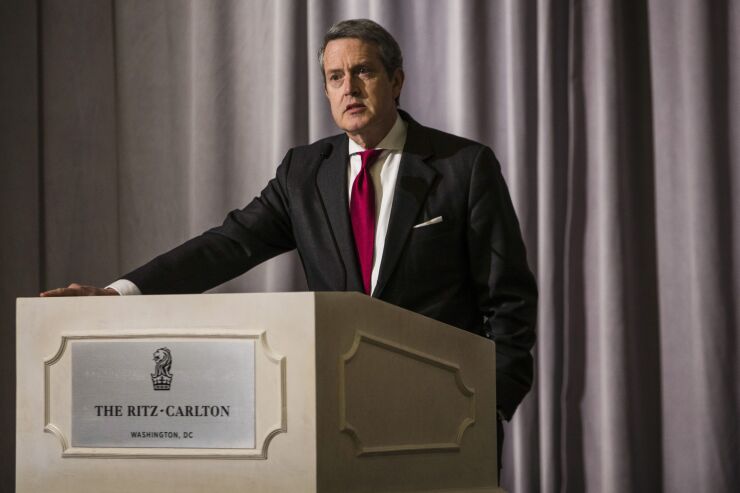WASHINGTON — The Federal Reserve Board and Federal Deposit Insurance Corp. are eyeing further changes to bank capital rules to help the industry confront the economic impact of the COVID-19 crisis, according to letters the two agencies sent Congress.
In a letter to Senate Banking Committee Chairman Mike Crapo, R-Idaho, the Fed's head of bank supervision said lawmakers should consider easing statutory requirements — known as the Dodd-Frank Act's Collins amendment — dealing with a bank's Tier 1 leverage capital ratio.
Fed Vice Chair of Supervision Randal Quarles said that that amendment is straining banks' ability to handle an influx of deposits in the stressed economic environment.
"Congress has amended ... [the Collins amendment] before, recognizing the complications it presents in tailoring a capital regime to a diverse financial sector and to changing risks in the financial system over time," Quarles said in the April 22 letter to Crapo. "In the current environment, it poses an additional challenge: complicating the regulatory agencies’ ability to address a severe economic stress period. Banking organizations are receiving significant inflows of customer deposits and the ability of these banking organizations to continue accepting significant deposits may become constrained due to Tier 1 leverage requirements."
The Senate Banking Committee posted the letters from Quarles and FDIC Chair Jelena McWilliams on its website this week. They were in response to Crapo's request for details about regulators' efforts during the crisis.

Quarles' request echoes steps the central bank took on its own at the beginning of April to ease its
"Liquidity conditions in Treasury markets have deteriorated rapidly, and financial institutions are receiving significant inflows of customer deposits along with increased reserve levels," the Fed said in its April 1 statement. "The regulatory restrictions that accompany this balance sheet growth may constrain the firms' ability to continue to serve as financial intermediaries and to provide credit to households and businesses."
In an April 10 letter to Crapo, McWilliams said her agency was considering steps to ease capital requirements to address the market strain for banks dealing with the effects of the pandemic crisis. Yet her letter notably left out any calls for congressional reforms.
The FDIC is considering “temporary changes to supplementary and tier 1 leverage ratios that would allow banking organizations to expand their balance sheets through deposits at the Federal Reserve Banks and/or acquisition of U.S. Treasury securities,” McWilliams wrote.
Such a move, McWilliams said, would “allow banking organizations experiencing significant inflows of deposits to continue serving these customers in a manner that does not create an incentive for banks to take additional risk.”
But Quarles stressed that legislation could provide further regulatory relief as banks accept more deposits.
"The regulatory agencies have taken unprecedented measures to ensure that the financial sector can meet this demand," he wrote. "The sector’s success in this task is a matter of national urgency, and in my view, congressional action to improve regulatory flexibility to respond would only help achieve it."
Jaret Seiberg, an analyst at Cowen Washington Research Group, said in a research note on Thursday that McWilliams' letter "implies that the agencies can act unilaterally without the need for legislation."
Seiberg said the "FDIC view makes more sense."
“Regulators also had the power under Basel 1 to make a temporary adjustment to a capital ratio,” he said. “So we don't see why it would not have retained that ability as long as the reduction was temporary rather than permanent.”





